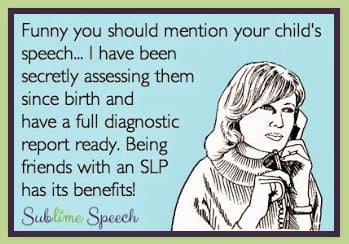Career Corner: Walking the Line Between Pediatric Therapist and Friend/Family
Editor’s Note: While this article was written by an SLP for SLPs, we think it is highly relevant for all pediatric therapy clinicians.
by Danielle Reed M.S., CCC-SLP
At some point in your career as an SLP, you will most likely have the above situation occur. I’m sure it is akin to a nurse or doctor being asked about a friend or family member’s health or a lawyer for their advice on a ticket somebody has been given. It is a situation that I have personally been involved in twice with very different results. There are some important things to keep in mind regarding your professional opinion and friends/family. I would like to thank my Facebook “likers” for their help in compiling this short list!
- Do not give advice unless you are asked: If a friend or family member trusts your opinion and asks you about their loved one, and you feel comfortable, you might decide to proceed with giving general or specific observations/advice. However, if a friend or family member does not approach you about the situation, the advice may be unwelcome and could result in a strained relationship.
- If you decide to give advice, giving general advice and/or observations and directing the person to seek an assessment in the area of concern from the appropriate party may be best. You have valuable information but in this situation, being the friend/family member can be more powerful than being the SLP. You have great knowledge and can be that person’s go-to for advice and information during the assessment of their loved one in a different agency/school.
- Deciding to mention a suspected difficulty/delay to a parent or family member without being asked can be beneficial if you believe it is severe enough and a family member doesn’t see it. For example if you notice signs of aspiration in a friend’s parents, you may help prevent aspiration pneumonia by mentioning it to the friend. Most will see this as coming from a genuine place of concern and will be thankful.
- Be prepared for the possibility of a backlash. It’s very hard to hear that the person you love may have a disability in the area of speech, language, etc. If you offer your opinion, it may not be received well and could result in a changed/strained relationship or even the termination of the relationship. While rare if they have asked for your opinion, it is possible.
- Don’t feel like you need to speak to areas that you are less familiar with. For example, as a school SLP for 20 years you may be less familiar with current research in dysphagia. If you feel less knowledgable about the area you are being asked about, steering friends and family members to resources including books, websites, and agencies for more information may be a good choice.
- Be honest with your friend/family member if you are not comfortable giving them advice or your opinion. I have personally had to say “I value our friendship and this might be a difficult conversation. I would love to give you some resources that will be very helpful and then I can help you along the way with anything you need.” Honestly, I think it saved our friendship. Had I talked to this friend, who has a son who has since been given a medical diagnosis of Autism, at that time about my concerns with regards to that she may have been defensive of her young son. I would completely understand but I’m not sure how our friendship would have faired. Now we can have open conversations about resources and information regarding Autism and I can be a friend first and an SLP second.
It’s a very difficult situation to be asked your advice about a friend or family member’s loved one. Walking the line between SLP and friend/family can be tricky. Keep the advice from SLP to SLP mentioned above in mind when deciding how to approach a situation. It is possible to wear 2 hats at once if you can balance them carefully!
About the Author: Danielle Reed M.S., CCC-SLP currently works with elementary students in Kansas City, MO. Her caseload spans everything from articulation to students with Autism utilizing AAC devices.
Her blog, Sublime Speech, provides creative ideas for Speech-Language Pathologists and parents including app reviews, articles, research, networking, and more. She also creates materials for therapy which are available on Teachers pay Teachers. Danielle can also regularly be found networking with #SLPeeps on Twitter and Facebook. Outside of therapy, she has a love of travel, photography, and delicious lattes.
PediaStaff is Hiring!
All JobsPediaStaff hires pediatric and school-based professionals nationwide for contract assignments of 2 to 12 months. We also help clinics, hospitals, schools, and home health agencies to find and hire these professionals directly. We work with Speech-Language Pathologists, Occupational and Physical Therapists, School Psychologists, and others in pediatric therapy and education.

